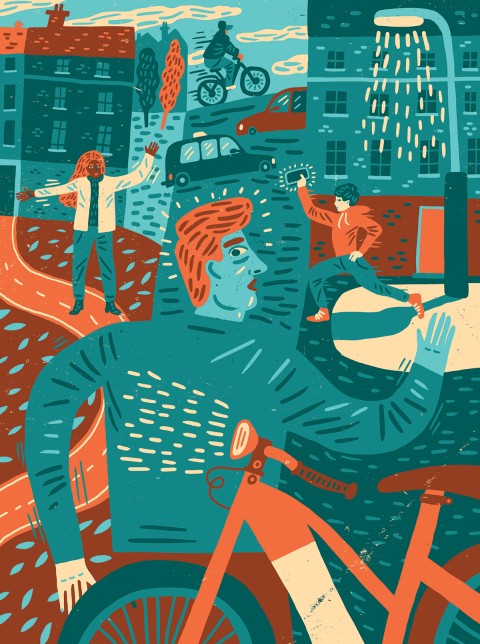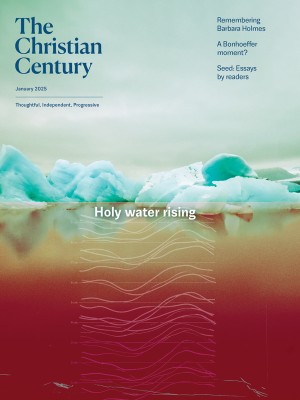
Illustration by Øivind Hovland
Not long ago I cycled back from northwest central London on a hired bike. I’d just dropped it at a docking station behind Canada House and was about to walk across Trafalgar Square back to St. Martin’s church. I got out my phone to text a thank you to the friend who’d just treated me to a day out at Lord’s Cricket Ground.
Suddenly from behind me a hand appeared and swooped my phone out of my grasp. The hand belonged to a teenager on an electric bike. In seconds, as I began to perceive what had happened, my assailant sped far away from me. I soon saw my predicament: the thief had my whole digital identity, plus my credit cards and driver’s license. I pathetically roared my horror and outrage.
Read our latest issue or browse back issues.
But then two extraordinary things happened. As I uselessly made middle-aged plodding chase, a woman 50 yards away, who’d somehow seen the incident, faced the thief’s bike, made herself wide like a star, stood in his way and shouted, “Stop it and drop it!” I was so dazed I scarcely realized what was happening. But when I turned around, a small boy was running toward me with my phone. I received it dumbfounded and dazed, like an audience taking back the ace of spades during a card trick. I thanked the boy, shaking his palm with my still-trembling hand. Only then did I realize that the cyclist had dropped the phone just as the woman had told him to. I looked around to thank her, but she was gone. The whole event took 20 seconds.
I’ve pondered the four characters in this story. First, the teenage thief. He was riding an expensive bike, though he might have stolen that, too. And he was skilled enough to ride without using his hands. I’d guess he’d performed that trick with my phone on other people before. Why was he not putting his talents to better use? And what life experience had led him to pull the kind of stunt that makes others miserable and jeopardizes his own liberty?
Next, the woman who stopped him. She could have ignored what happened, or told herself it was difficult to identify what was going on amid the kerfuffle. Instead, she acted by a selfless reflex, put herself in physical danger, found both action and words, and surprised the young man so much that he did exactly what she told him to do. She involved herself in my life and his, affected both for the better, and, as if to prove she sought no credit or reward, disappeared before I could even identify her.
Then the little boy who handed me the phone. I’d guess he was about eight. I don’t think he was connected in any way to the woman. He must have run into the road to save my phone from being crushed. Again, he acted from impulse and not from considered thought. He could have hidden behind his youth or self-protection from the dangers of the big city. But he stepped up and did a simple, kind thing. The woman’s courage would have been less help to me if the little boy hadn’t seen where the phone landed and rescued it from the approaching traffic.
And then me. Absorbed in my day, not focused on the people around me but preoccupied by the message I was sending, swooped upon as if I were a small animal being lifted off by a bird of prey. Rescued by a brave stranger and restored by a young bystander. Too shocked to be grateful, too shaken to linger and work out whose mercy had rescued me, too bewildered to appreciate that what I needed to do was find my savior and give her appropriate thanks.
All four characters have wider significance. In the face of a global crisis like COVID, we depend on those who, like the courageous woman, go to strenuous lengths in sometimes daunting and demanding circumstances to give people what they desperately need. Just as vital are those who are like the little boy, who bring the fruits of others’ labor to those in need of it.
But in the face of a crisis like the climate emergency, we’ve come to appreciate humankind as a whole, one whose instrumentalization of creation has disfigured the earth: in different ways, all of us resemble that plundering cyclist. And in my bereft and bewildered demeanor, we can see another side of ourselves, one that feels we’ve lost something that belonged to us—whether our youth, our innocence, our well-being, our security, or our hope—and can’t get it back without a lot of help and something of a miracle.
More subtly, this 20-second episode gives us a picture of God. A God who, like the woman, at great risk raises us to life; who, like the young boy, gently offers us the incredible gift of restoration; and who, like me, has been willfully robbed of something—human companionship and belonging on the earth—something it feels impossible to live without.
My 20-second microdrama showed me life’s fragility and apparent randomness, but also life’s choice: choice to despoil and destroy or to restore and repair. At such moments we stand before the gracious mercy of God and ponder the many ways we can respond.






